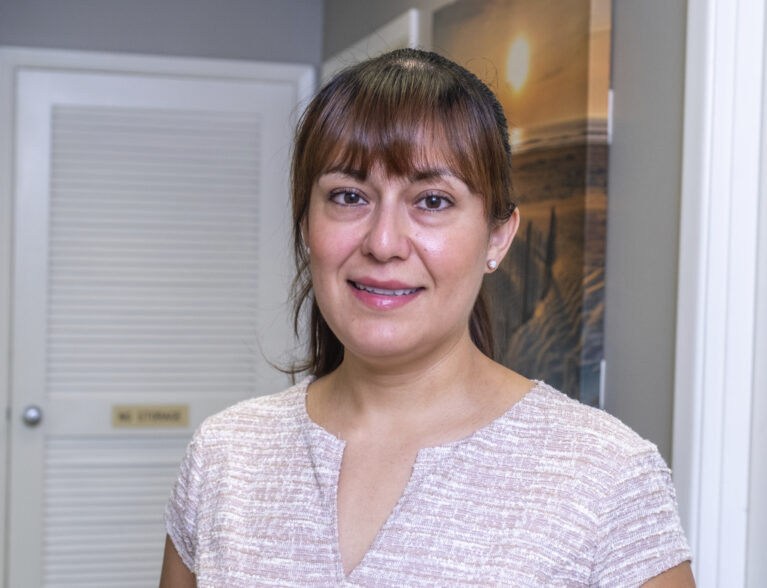
Metabolic dysfunction-associated steatotic liver disease, or MASLD, is a chronic disease that occurs when the liver builds up too much fat. It can take decades to develop and often is asymptomatic.
The National Institutes of Health reports that as the rates of obesity and type 2 diabetes continue to increase globally, so does the prevalence of MASLD. Currently, 38 percent of all adults and as many as 14 percent of children and adolescents have it. By 2040, the MASLD prevalence rate for adults is projected to increase to over 55 percent.
Tania Lopez, DO, a gastroenterologist with Orlando Health Sebastian River Hospital, says the good news is that the condition is treatable and – to a great extent – preventable.
“When fat gets into your liver, it can cause inflammation which, if it continues to advance, scars the liver, leading to cirrhosis,” says Dr. Lopez.
“Unfortunately, MASLD is on the increase because our diets are getting worse. We’re being enticed by [unhealthy] food everywhere – in ads and on billboards – and people often don’t make healthy choices.”
Prior to 2024, MASLD was known as NAFLD (non-alcoholic fatty liver disease). The Fatty Liver Alliance explains the change in terminology is intended to reduce stigma, enhance clinical diagnosis, and broaden disease awareness.
Who is most at risk to develop MASLD? “Those who are overweight or obese, have diabetes and have an MBI over 25,” says Dr. Lopez.
Johns Hopkins University explains that anyone with excess weight (especially belly fat), high triglycerides or LDL cholesterol, type 2 diabetes or prediabetes, and high blood pressure can have metabolic syndrome. People with metabolic syndrome often have fatty liver and are more likely to have heart disease.
In the United States, the condition is more prevalent among Latinos than non-Latinos because they may carry a genetic variant that can lead to fat accumulation in the liver.
Other conditions that may raise your risk of developing MASLD include polycystic ovary syndrome, sleep apnea and hypothyroidism.
“We’re seeing pediatric cases as the ages of children with MASLD get younger and younger,” says Dr. Lopez.
Mayo Clinic states that MASLD is the leading cause of liver disease among children today, affecting up to 38 percent of children with obesity in the United States. Not all children with MASLD are obese. The prevalence of the disease in children has increased by 270 percent since the late 1980s.
Dr. Lopez explains that many cases of MASLD go undiagnosed because it is basically asymptomatic. “Many patients don’t even know what it is, so even if they do have symptoms, they don’t realize they should be sharing this information with their doctor or medical professional.”
The American College of Gastroenterology says although there are no symptoms at the beginning, as the disease progresses affected people may develop fatigue, a dull or aching pain in the upper right abdomen, unexpected weight loss, jaundice, long-lasting itching, spider-like blood vessels on the skin and swelling in the legs, ankles, feet or abdomen.
According to Dr. Lopez, reversing MASLD is usually as basic as controlling your weight with a healthy diet, like the Mediterranean Diet. “Even a weight loss as low as 5 percent can help,” she says. “Exercising for 150 minutes a week is also important.
“Unless there’s another reason you shouldn’t be drinking alcohol, low to moderate consumption should be OK.”
In March 2024, the FDA approved Rezdiffra for adults with noncirrhotic non-alcoholic steatohepatitis, an advanced form of MASLD, who have moderate to advanced liver scarring. It is used along with diet and exercise. “However, not everyone who has fatty liver disease qualifies for it,” says Dr. Lopez.
“Because it is so underdiagnosed, it is important for people with MASLD risk factors to ask their doctors to examine them thoroughly. Advise them of any symptoms you are having, even if you don’t think they’re connected to MASLD. It is important to educate yourself ASAP about what you can do to prevent and/or treat this disease.”
Tania Lopez, DO, is a gastroenterologist with Orlando Health Sebastian River Hospital. She received her medical degree from Nova Southeastern University College of Osteopathic Medicine and did her residency at CEME/Largo Medical Center. She is board-certified by the American Osteopathic Board of Internal Medicine. Dr. Lopez has two office locations in Indian River County: 3745 11th Circle, Suite 101, Vero Beach, and 7915 83rd Ave., Sebastian. Call 772-217-3082 for an appointment.



